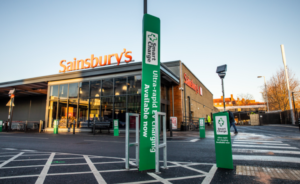The Pollution Pandemic – Lessons from Lockdown
In this year’s December Magazine, Editor Pippa Neill reflects on what the Covid-19 pandemic has taught us about air pollution.
When the UK entered the very first national lockdown on 24 March 2020, Air Quality News was one of the first media outlets to report on the sudden change in air pollution.
After analysing data from the Department for Energy, Food and Rural Affairs (DEFRA), we found that on the first day of lockdown air pollution had halved in some cities. The biggest decrease was seen in Edinburgh where nitrogen dioxide (NO2) concentrations fell from 74µg/m3 in 2019, to 28µg/m3 in 2020.
With the roads empty and the public breathing in clean air for the first time in a generation, the wider media soon picked up on these changes. Videos of dolphins in the canals of Venice and memes stating that ‘nature is healing’ went viral on social media. We all saw first-hand the clear connection between our own activities and pollution.
These changes didn’t just have a visual impact, but according to research published in June 2020 by the British Lung Foundation, during the first lockdown two million people with respiratory conditions such as asthma experienced reduced symptoms.
However, halting the economy for the sake of the environment is never going to be a viable solution and soon our air pollution levels returned to ‘normal.’ By July 2020, with the majority of the restrictions over, air pollution levels had more or less returned to pre-pandemic levels.

Health outcomes
The sudden change in our environment wasn’t the only way that air pollution came to the forefront of our conversations. As researchers learned more about the virus, they quickly realised that exposure to air pollution may actually be connected to covid outcomes.
Historically, air pollution has largely been associated with ‘non-communicable’ diseases, meaning diseases that can’t be directly transmitted between people, such as lung disease. However, a key finding during the Covid-19 pandemic is that air pollution may also be linked to infectious diseases.
Given the nature and urgency of the situation, people started publishing research on non-peer reviewed websites. In the age of fake news and misinformation and with a plethora of research out there of varying types and quality, the Greater London Authority and Department for Transport commissioned researchers from Imperial College London to review the research.
Professor Klea Katsouyanni who oversaw this review tells Air Quality News: ‘Having analysed all of this research, one thing is clear and that is that long-term exposure to air pollution makes people more susceptible to Covid-19 and actually changes the morbidity profile of the population.’
This finding is hardly surprising. Scientists, doctors and campaigners have long been highlighting that air pollution is harming our respiratory health. With exposure to even so-called ‘safe levels’ of air pollution linked to the development of asthma, stunted lung growth, lung disease and COPD.
When we are living through a respiratory pandemic with a virus that attacks our lungs, it is hardly surprising that decades of neglect over the quality of our air will come to the forefront.
According to a large study conducted by the Office for National Statistics (ONS), a small, single unit increase in people’s exposure to particulate matter (PM2.5) pollution over the previous decade may increase the death rate from Covid-19 by up to 6%. A single unit increase in nitrogen dioxide (NO2) is linked to a 2% increase in death rates.
Many academics have highlighted how these findings have shown up in real-terms with the unequal outcomes of Covid-19. According to the ONS, black male citizens are four times more likely to die from Covid-19 than their white male counterparts. This is reportedly due to many compounding socio-economic factors, from access to health and social care to living in more overcrowded households.
But one factor which cannot be ignored is air pollution. According to researchers at King’s College London, black communities in London are disproportionately more likely to breathe in illegal levels of air pollution. They found that Black, African and Caribbean people account for 15.3% of all Londoners exposed to nitrogen dioxide (NO2) levels that breach EU limits, despite only accounting for 13.3% of the city’s population.
Professor Katsouyanni says: ‘Several of the studies we looked at show that people who have lower socioeconomic status or are from certain demographic groups are exposed to more air pollution, Covid-19 has highlighted this issue and brought it to the forefront, we must now use it to create action.’

But why has it taken a pandemic to highlight this issue?
We have long known that air pollution is harming our health, with scientists highlighting for decades that exposure is linked to lung cancer, cardiovascular attacks and neurological issues.
According to the World Health Organisation (WHO) air pollution is responsible for an estimated 10 million deaths every single year. This is more than the deaths from AIDS, tuberculosis and malaria combined. Yet despite this, over the past few decades, action on air pollution has fallen by the way-side.
In a recent article in the London Review of Books, author David Wallace-Wells writes: ‘If the pandemic so terrified us that billions of us retreated into panicked cocoons for months, what can explain or justify our blindness and indifference towards ten million lives ended each year by repeated smog inhalation?
‘These numbers demand that we reorder our picture of the world we live in, recalculating the brutality of the present. It becomes plain that clean air and clean water and human health should be restored to the centre of the environmental crusade – rather than at the margins.’
Many campaigners are therefore calling for a covid-like response to deal with the air pollution and the climate crisis.
The role of clean air to stop the spread
As we have learned more about the Covid-19 virus, safety advice has changed dramatically. From mask wearing to hand washing it’s been a confusing time, but the UK government is now clear that good ventilation can play a key role in helping to prevent the spread. The government’s website now states: ‘Bringing fresh air into a room and removing older stale air that contains virus particles reduces the chance of spreading Covid-19. The more fresh air that is brought inside, the quicker any airborne virus will be removed from the room.’
This quest for clean indoor air has led many air purifier manufacturers to imply or claim that their machines can protect us from the virus.
The biggest study into the matter so far was published by the Centre for Disease Control in the U.S. This suggested that portable Hepa air cleaners could reduce levels of virus aerosols indoors. However, consumer champion Which? have responded to this study stating: ‘The results don’t change our advice about air purifiers, which is that you “shouldn’t rely on them.”’
Taking these lessons forward
The ways in which air pollution is linked to Covid-19 are vast and complicated, but one thing is clear, if you look after the air we breathe – it will lead to better respiratory health, enabling the general population to be better able to cope as we continue to battle with the Covid-19 pandemic.
Professor Katsouyanni concludes: ‘We have been saying for many years that pollution is an important public health issue, and if there is one positive outcome from the Covid-19 pandemic it’s that we can use this research to highlight and campaign for cleaner air.
‘We are now in a situation where we can clearly demonstrate the benefits of reducing air pollution in our cities and worldwide. We have to put this forward and tell the public and governments that air pollution is a public problem and improving it will be good for public health in every sense, including for infectious diseases.’
This article first appeared in the December Air Quality News magazine, click here to view.
















